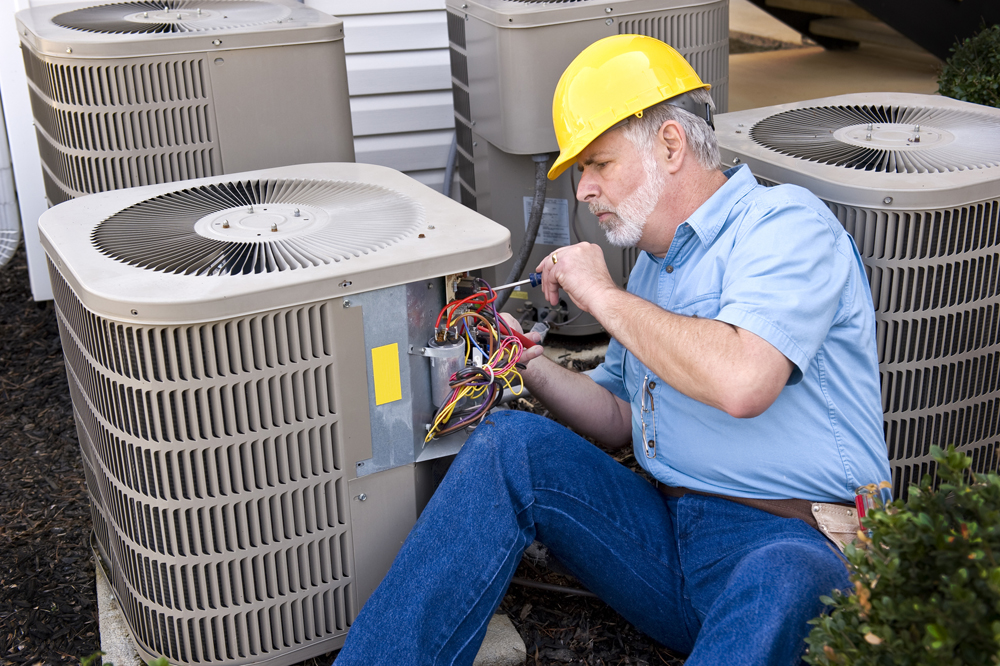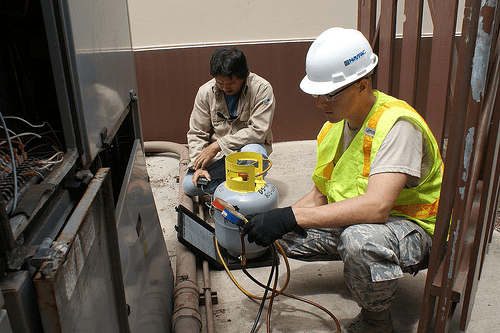Getting Started with heat pump installation ooltewah tn
Getting Started with heat pump installation ooltewah tn
Blog Article
Choosing In Between a Heatpump and Furnace: Key Factors To Consider for Your HVAC Needs
When assessing heating choices for a/c needs, the choice in between a warmth pump and a furnace can be intricate. Each system supplies distinct benefits customized to specific environments and power effectiveness goals. Comprehending these differences is important for making an informed choice. Key variables such as installation costs and ecological effect better make complex the choice process. Which option really lines up with one's comfort and sustainability preferences? The complying with sections will discover these factors to consider in information.
Understanding Warmth Pumps: Exactly How They Work and Their Advantages
While numerous home owners take into consideration different home heating alternatives, recognizing just how warmth pumps feature and their advantages can substantially influence their choice. Heatpump operate by moving heat instead of producing it. In the winter, they remove heat from the outside air or ground and transfer it indoors, while in the summer season, they reverse this procedure, cooling the home by expelling heat outside. This twin functionality makes them versatile for year-round climate control.One of the primary benefits of heatpump is their power performance. They use considerably less power contrasted to conventional home heating systems, potentially leading to reduced energy costs (furnace replacement). In addition, heatpump have a smaller carbon footprint, making them an environmentally friendly selection. They also need much less upkeep than conventional systems, adding to long-lasting cost savings. Overall, recognizing the technicians and benefits of heat pumps can assist homeowners make informed choices concerning their home heating and cooling requirements
Exploring Furnaces: Kinds, Procedure, and Advantages
Heating systems are available in various types, consisting of gas, electric, and oil designs, each with unique functional systems. Understanding these differences is crucial, as they impact effectiveness and heating performance. In addition, heating systems provide many benefits, such as constant heat outcome and dependability in chillier environments.
Kinds of Heaters
Furnace can differ considerably in style and operation, with heating systems being a popular choice amongst homeowners. There are several sorts of furnaces, each utilizing various fuel resources and modern technologies. Gas heaters are typical, leveraging all-natural gas to produce warmth efficiently. Electric heating systems, on the other hand, make use of electric resistance to create heat, commonly preferred for their straightforward installation. Oil heaters, while less typical, are effective in locations with minimal gas gain access to (furnace replacement). Furthermore, condensing furnaces optimize energy performance by recording and recycling exhaust gases. Each kind runs via a system of warmth exchangers and ductwork to distribute cozy air throughout a home. Recognizing the distinctions in between these heater kinds is crucial for informed a/c decisions
Advantages of Heaters
For house owners seeking reliable heat during cool months, the benefits of heating systems are substantial. Furnaces provide constant heating, guaranteeing even temperatures throughout the home. They are particularly effective in severe chilly, usually outshining heatpump in freezing problems. Numerous types, including gas, electric, and oil heating systems, offer flexibility to satisfy varied demands and preferences.Furnaces additionally often tend to have lower preliminary installation prices contrasted to heatpump, making them a much more accessible alternative for numerous. Their durable design adds to a longer life-span, with several units lasting over 15 years with proper maintenance. Furthermore, modern heaters are often outfitted with innovative modern technology for boosted performance, which can lead to minimized energy costs. Generally, furnaces continue to be a reputable selection for effective home heating.

Power Performance: Contrasting Warm Pumps and Furnaces
When contrasting power effectiveness in between heat pumps and furnaces, the Seasonal Energy Effectiveness Ratio (SEER) plays a crucial duty in figuring out efficiency. In addition, a functional expense analysis exposes the lasting monetary ramifications of each system. Comprehending these factors can lead homeowners in making educated choices concerning their home heating options.
Seasonal Energy Efficiency Proportion
Power performance plays a necessary function in the decision-making procedure between heatpump and heating systems, particularly when taking into consideration the Seasonal Energy Performance Ratio (SEER) This metric measures the cooling effectiveness of heatpump over a whole air conditioning period, offering a standardized method to examine performance. Higher SEER ratings suggest better power effectiveness, translating to reduced energy intake and minimized energy expenses. In comparison, heaters are usually examined utilizing the Yearly Gas Use Efficiency (AFUE) ranking, which shows heating effectiveness. When comparing these two systems, property owners must prioritize SEER rankings for heatpump, as they directly effect total power financial savings and environmental sustainability. An extensive understanding of SEER can especially influence the lasting contentment and cost-effectiveness of the chosen heating and cooling solution.
Operational Cost Evaluation
Understanding the functional expenses associated with warmth pumps and heaters is crucial for homeowners assessing their choices. Warm pumps usually offer higher energy effectiveness, transforming electric energy into warmth with very little waste. This causes reduced monthly energy expenses, particularly in modest climates. Alternatively, conventional heating systems, specifically gas models, may have lower in advance find out here prices but can incur greater operational costs in time due to fuel prices and performance ratings.Moreover, heatpump can operate as both home heating and cooling systems, potentially decreasing the need for different heating and cooling units. While first investments for heat pumps may be higher, their lasting cost savings in power effectiveness can make them a much more affordable choice visit this site for several houses. Cautious evaluation of local power prices is important to determine the very best choice.
Installation Expenses: What to Anticipate for Each Heater
Installment expenses for furnace can vary considerably in between heatpump and heating systems, affecting house owners' decisions. Warmth pumps generally have higher in advance installation prices, commonly varying from $3,500 to $8,000, depending on the device dimension and complexity of installment. This consists of the outdoor unit, indoor handling system, and needed ductwork adjustments. Alternatively, heaters often tend to have lower preliminary costs, averaging in between $2,500 and $6,000, which can be appealing for budget-conscious homeowners. Installation expenditures can boost if substantial ductwork is required.Moreover, the option of fuel type for heating systems-- natural gas, gas, or electric-- can also influence setup costs. While heatpump offer energy effectiveness, their preliminary investment might hinder some customers. Ultimately, evaluating installation costs alongside lasting savings and performance will aid property owners in making educated decisions concerning their heating unit.
Climate Factors To Consider: Which System Carries Out Much Better in Your Location
How do climate problems affect the effectiveness of heating unit? The efficiency of warm pumps and heaters can vary greatly relying on the neighborhood environment. In modest environments, warmth pumps excel by efficiently moving warmth from the outdoors air, making them an energy-saving choice. However, their performance decreases in exceptionally cool temperatures, where they might battle to remove sufficient warmth. Conversely, heating systems, specifically gas designs, provide reliable and constant heat despite outdoor conditions, making them more suitable in colder regions.In areas that experience milder winters months, heat pumps can operate efficiently year-round, offering both cooling and heating. In comparison, areas with rough winter seasons usually take advantage of the robustness of furnaces. see this site Inevitably, understanding the local climate is essential when determining in between a warm pump and a furnace, as it directly impacts their functional effectiveness and total efficiency.
Maintenance Demands: Long-Term Look After Warmth Pumps vs. Furnaces
While both heatpump and heaters call for normal upkeep to ensure peak efficiency, their specific needs and care routines differ substantially. Furnaces generally require less frequent attention, with annual assessments being enough to look for gas leaks, tidy filters, and evaluate general performance. Their less complex style often enables straightforward repairs.In contrast, heat pumps demand biannual upkeep due to their twin role in cooling and heating. This consists of cleansing coils, checking cooling agent levels, and making sure that both the outside and indoor systems operate at their best. Furthermore, heatpump upkeep usually involves more detailed parts, making expert maintenance essential.Neglecting upkeep can cause diminished effectiveness and raised energy prices for both systems. Ultimately, home owners should think about these long-lasting care demands when picking between a heatpump and a heater, as positive upkeep can extend the life expectancy and efficiency of either system significantly.
Ecological Influence: Picking a Sustainable Heating Choice
The environmental influence of heating systems is an essential assessment for house owners seeking sustainable choices. Heatpump are usually more energy-efficient than conventional heating systems, as they transfer warm as opposed to produce it, considerably decreasing carbon exhausts. By using sustainable power resources, such as geothermal or air-source warmth pumps, homeowners can further minimize their ecological footprint.On the other hand, gas heaters emit greenhouse gases and add to air pollution, though they frequently offer higher warmth outcome. Nevertheless, developments in modern technology have actually brought about the growth of high-efficiency heating systems that reduce emissions.Ultimately, choosing a heating system entails evaluating effectiveness versus environmental effect. Property owners are urged to mirror on regional energy resources and rewards for eco-friendly systems, making sure a choice that lines up with both personal comfort and environmental duty. The decision influences not only immediate convenience but likewise long-lasting sustainability and ecological health.
Often Asked Inquiries
The Length Of Time Do Warmth Pumps and Furnaces Typically Last?
The life-span of heat pumps normally ranges from 15 to twenty years, while furnaces can last between 15 to three decades. Regular upkeep significantly impacts their longevity and effectiveness in supplying home heating options.
Can I Make Use Of a Heat Pump in Very Cold Climates?
Heatpump can run in extremely chilly climates, however their performance reduces as temperatures decrease. In such conditions, supplementary home heating resources may be essential to preserve comfy interior temperature levels and guarantee peak efficiency.

What Is the Noise Level of Heat Pumps Versus Furnaces?
The sound degrees of warmth pumps and heating systems vary considerably. Generally, heat pumps run more silently than standard furnaces, making them preferable for those sensitive to sound, while heaters may produce louder operational sounds during heating cycles.
Are Warmth Pumps Suitable for Both Heating & Cooling?
Heatpump are certainly ideal for both cooling and heating (heat pump installation ooltewah tn). They work by transferring warmth, providing effective temperature level control year-round, making them a functional selection for home owners looking for an all-in-one heating and cooling solution
What Dimension Heating Unit Do I Required for My Home?
Determining the suitable size heating unit for a home requires reviewing factors such as square video, insulation high quality, neighborhood climate, and the home's layout. Consulting a specialist can ensure an exact analysis and ideal comfort. Warmth pumps normally provide higher energy effectiveness, converting electrical energy into warm with marginal waste. In modest climates, warm pumps succeed by successfully moving warmth from the outside air, making them an energy-saving option. On the other hand, furnaces, particularly gas models, offer constant and trustworthy warmth regardless of exterior problems, making them more effective in chillier regions.In locations that experience milder wintertimes, warmth pumps can run effectively year-round, offering both heating and cooling. Heat pumps are generally more energy-efficient than typical furnaces, as they transfer warm instead than produce it, considerably lowering carbon discharges. By making use of sustainable power sources, such as air-source or geothermal warmth pumps, property owners can even more reduce their eco-friendly footprint.On the various other hand, all-natural gas heating systems emit greenhouse gases and contribute to air pollution, though they typically offer higher warmth outcome.
Report this page